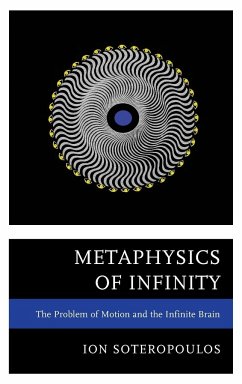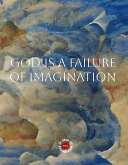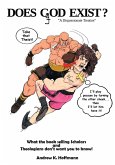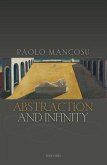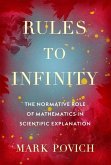- Gebundenes Buch
- Merkliste
- Auf die Merkliste
- Bewerten Bewerten
- Teilen
- Produkt teilen
- Produkterinnerung
- Produkterinnerung
Ion Soteropoulos reconciles the contradiction between the finite and infinite and transforms this reconciliation into the founding principle of motion. This book will appeal to readers interested in the logical mechanics of the physical universe, the hidden powers of our finite brain, and the utility of robots in the future.
Andere Kunden interessierten sich auch für
![Whitehead's Radically Temporalist Metaphysics Whitehead's Radically Temporalist Metaphysics]() George AllanWhitehead's Radically Temporalist Metaphysics114,99 €
George AllanWhitehead's Radically Temporalist Metaphysics114,99 €![God is a Failure of Imagination God is a Failure of Imagination]() A. TwozedGod is a Failure of Imagination11,99 €
A. TwozedGod is a Failure of Imagination11,99 €![Philosophical Perspectives on Infinity Philosophical Perspectives on Infinity]() Graham OppyPhilosophical Perspectives on Infinity96,99 €
Graham OppyPhilosophical Perspectives on Infinity96,99 €![The Infinity Principle The Infinity Principle]() Jann DewitThe Infinity Principle14,99 €
Jann DewitThe Infinity Principle14,99 €![Does Ggod Exist? Does Ggod Exist?]() Andrew K. HoffmannDoes Ggod Exist?59,99 €
Andrew K. HoffmannDoes Ggod Exist?59,99 €![Abstraction and Infinity Abstraction and Infinity]() Paolo MancosuAbstraction and Infinity105,99 €
Paolo MancosuAbstraction and Infinity105,99 €![Rules to Infinity Rules to Infinity]() Mark PovichRules to Infinity104,99 €
Mark PovichRules to Infinity104,99 €-
-
-
Ion Soteropoulos reconciles the contradiction between the finite and infinite and transforms this reconciliation into the founding principle of motion. This book will appeal to readers interested in the logical mechanics of the physical universe, the hidden powers of our finite brain, and the utility of robots in the future.
Hinweis: Dieser Artikel kann nur an eine deutsche Lieferadresse ausgeliefert werden.
Hinweis: Dieser Artikel kann nur an eine deutsche Lieferadresse ausgeliefert werden.
Produktdetails
- Produktdetails
- Verlag: Globe Pequot Publishing Group Inc/Bloomsbury
- Seitenzahl: 120
- Erscheinungstermin: 26. November 2013
- Englisch
- Abmessung: 235mm x 157mm x 11mm
- Gewicht: 336g
- ISBN-13: 9780761861461
- ISBN-10: 0761861467
- Artikelnr.: 38126207
- Herstellerkennzeichnung
- Libri GmbH
- Europaallee 1
- 36244 Bad Hersfeld
- gpsr@libri.de
- Verlag: Globe Pequot Publishing Group Inc/Bloomsbury
- Seitenzahl: 120
- Erscheinungstermin: 26. November 2013
- Englisch
- Abmessung: 235mm x 157mm x 11mm
- Gewicht: 336g
- ISBN-13: 9780761861461
- ISBN-10: 0761861467
- Artikelnr.: 38126207
- Herstellerkennzeichnung
- Libri GmbH
- Europaallee 1
- 36244 Bad Hersfeld
- gpsr@libri.de
Ion Soteropoulos is an independent researcher, philosopher, and scientific metaphysician. She was born in Greece and studied philosophy at the University of Paris, where she founded the Apeiron Centre (AC), a philosophical organization. Her research interests include the nature and organizing principles of the physical universe, the human brain, and the meaning of our accelerating growth. This book is the result of thirty years of meditation on the nature of motion and its associated contradictions in light of Greek Ionian philosophy.
List of Figures Preface Chapter 1: Why Motion from a to b Is Impossible:
The Analytic Principles of Thought Declare Motion Self-Contradictory The
Analytic Principle of Inequality and Temporal Order Destroys Motion from a
to b Analytic Convergence and the Apparent Passage to the Limit Chapter 2:
The Founding Principle of Continuous Motion Chapter 3: Geometric Solution
to the Problem of Motion: The Infinite Sphere The Universal Motion of the
Infinite Sphere The Limiting Boundary of the Infinite Sphere Chapter 4:
What Is Quantity? Complex Quantities in Bodies Moving at the Speed of Light
Is the Infinite Body Perceptible? Chapter 5: How Powerful Is Our Brain?
Simple Bit/Complex Bit The Finite Measure of the Brain's Maximum
Computational and Memory Powers Cosmic Singularity and the Holographic
Principle The Cosmic Singularity's Infinite Computational Power The Cosmic
Singularity's Infinite Memory Power The Infinite Measure of the Brain's
Maximum Computational and Memory Powers Why in the Future We Do Not Need
Computers Chapter 6: Toward an Accomplished Humanism: A Critique of the
Finite Analytic Paradigm of Contemporary Empirical Science The Observable
Universe Is Simple, Euclidean, and Time-Conditioned The Paradox of the
Indefinitely Accelerating Observable Universe The Paradox of the
Brain-Extending Technologies The Principle of Computing Number Versus the
Principle of Infinite Living Nature Re-Linking With Our Inner Infinite
Power Source For an Accomplished Humanism Glossary Bibliography Index
The Analytic Principles of Thought Declare Motion Self-Contradictory The
Analytic Principle of Inequality and Temporal Order Destroys Motion from a
to b Analytic Convergence and the Apparent Passage to the Limit Chapter 2:
The Founding Principle of Continuous Motion Chapter 3: Geometric Solution
to the Problem of Motion: The Infinite Sphere The Universal Motion of the
Infinite Sphere The Limiting Boundary of the Infinite Sphere Chapter 4:
What Is Quantity? Complex Quantities in Bodies Moving at the Speed of Light
Is the Infinite Body Perceptible? Chapter 5: How Powerful Is Our Brain?
Simple Bit/Complex Bit The Finite Measure of the Brain's Maximum
Computational and Memory Powers Cosmic Singularity and the Holographic
Principle The Cosmic Singularity's Infinite Computational Power The Cosmic
Singularity's Infinite Memory Power The Infinite Measure of the Brain's
Maximum Computational and Memory Powers Why in the Future We Do Not Need
Computers Chapter 6: Toward an Accomplished Humanism: A Critique of the
Finite Analytic Paradigm of Contemporary Empirical Science The Observable
Universe Is Simple, Euclidean, and Time-Conditioned The Paradox of the
Indefinitely Accelerating Observable Universe The Paradox of the
Brain-Extending Technologies The Principle of Computing Number Versus the
Principle of Infinite Living Nature Re-Linking With Our Inner Infinite
Power Source For an Accomplished Humanism Glossary Bibliography Index
List of Figures Preface Chapter 1: Why Motion from a to b Is Impossible:
The Analytic Principles of Thought Declare Motion Self-Contradictory The
Analytic Principle of Inequality and Temporal Order Destroys Motion from a
to b Analytic Convergence and the Apparent Passage to the Limit Chapter 2:
The Founding Principle of Continuous Motion Chapter 3: Geometric Solution
to the Problem of Motion: The Infinite Sphere The Universal Motion of the
Infinite Sphere The Limiting Boundary of the Infinite Sphere Chapter 4:
What Is Quantity? Complex Quantities in Bodies Moving at the Speed of Light
Is the Infinite Body Perceptible? Chapter 5: How Powerful Is Our Brain?
Simple Bit/Complex Bit The Finite Measure of the Brain's Maximum
Computational and Memory Powers Cosmic Singularity and the Holographic
Principle The Cosmic Singularity's Infinite Computational Power The Cosmic
Singularity's Infinite Memory Power The Infinite Measure of the Brain's
Maximum Computational and Memory Powers Why in the Future We Do Not Need
Computers Chapter 6: Toward an Accomplished Humanism: A Critique of the
Finite Analytic Paradigm of Contemporary Empirical Science The Observable
Universe Is Simple, Euclidean, and Time-Conditioned The Paradox of the
Indefinitely Accelerating Observable Universe The Paradox of the
Brain-Extending Technologies The Principle of Computing Number Versus the
Principle of Infinite Living Nature Re-Linking With Our Inner Infinite
Power Source For an Accomplished Humanism Glossary Bibliography Index
The Analytic Principles of Thought Declare Motion Self-Contradictory The
Analytic Principle of Inequality and Temporal Order Destroys Motion from a
to b Analytic Convergence and the Apparent Passage to the Limit Chapter 2:
The Founding Principle of Continuous Motion Chapter 3: Geometric Solution
to the Problem of Motion: The Infinite Sphere The Universal Motion of the
Infinite Sphere The Limiting Boundary of the Infinite Sphere Chapter 4:
What Is Quantity? Complex Quantities in Bodies Moving at the Speed of Light
Is the Infinite Body Perceptible? Chapter 5: How Powerful Is Our Brain?
Simple Bit/Complex Bit The Finite Measure of the Brain's Maximum
Computational and Memory Powers Cosmic Singularity and the Holographic
Principle The Cosmic Singularity's Infinite Computational Power The Cosmic
Singularity's Infinite Memory Power The Infinite Measure of the Brain's
Maximum Computational and Memory Powers Why in the Future We Do Not Need
Computers Chapter 6: Toward an Accomplished Humanism: A Critique of the
Finite Analytic Paradigm of Contemporary Empirical Science The Observable
Universe Is Simple, Euclidean, and Time-Conditioned The Paradox of the
Indefinitely Accelerating Observable Universe The Paradox of the
Brain-Extending Technologies The Principle of Computing Number Versus the
Principle of Infinite Living Nature Re-Linking With Our Inner Infinite
Power Source For an Accomplished Humanism Glossary Bibliography Index

